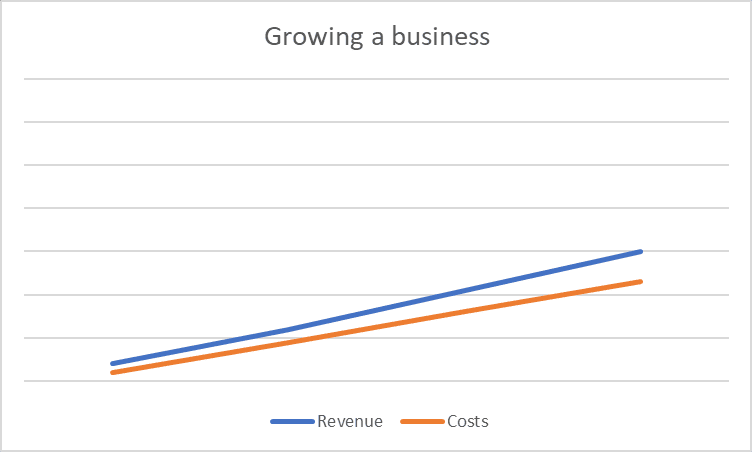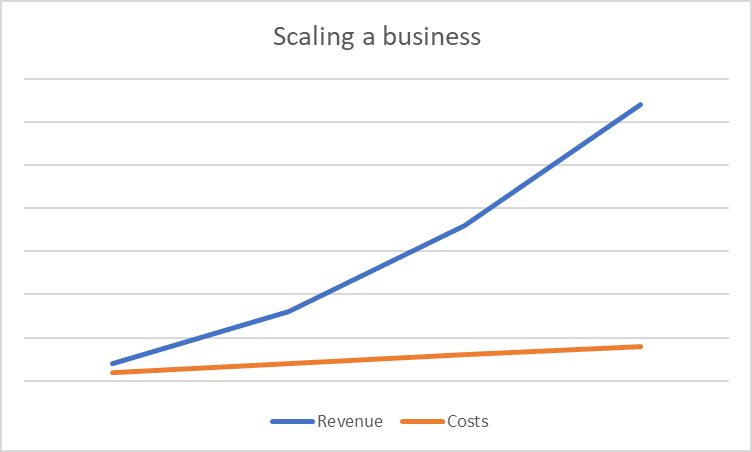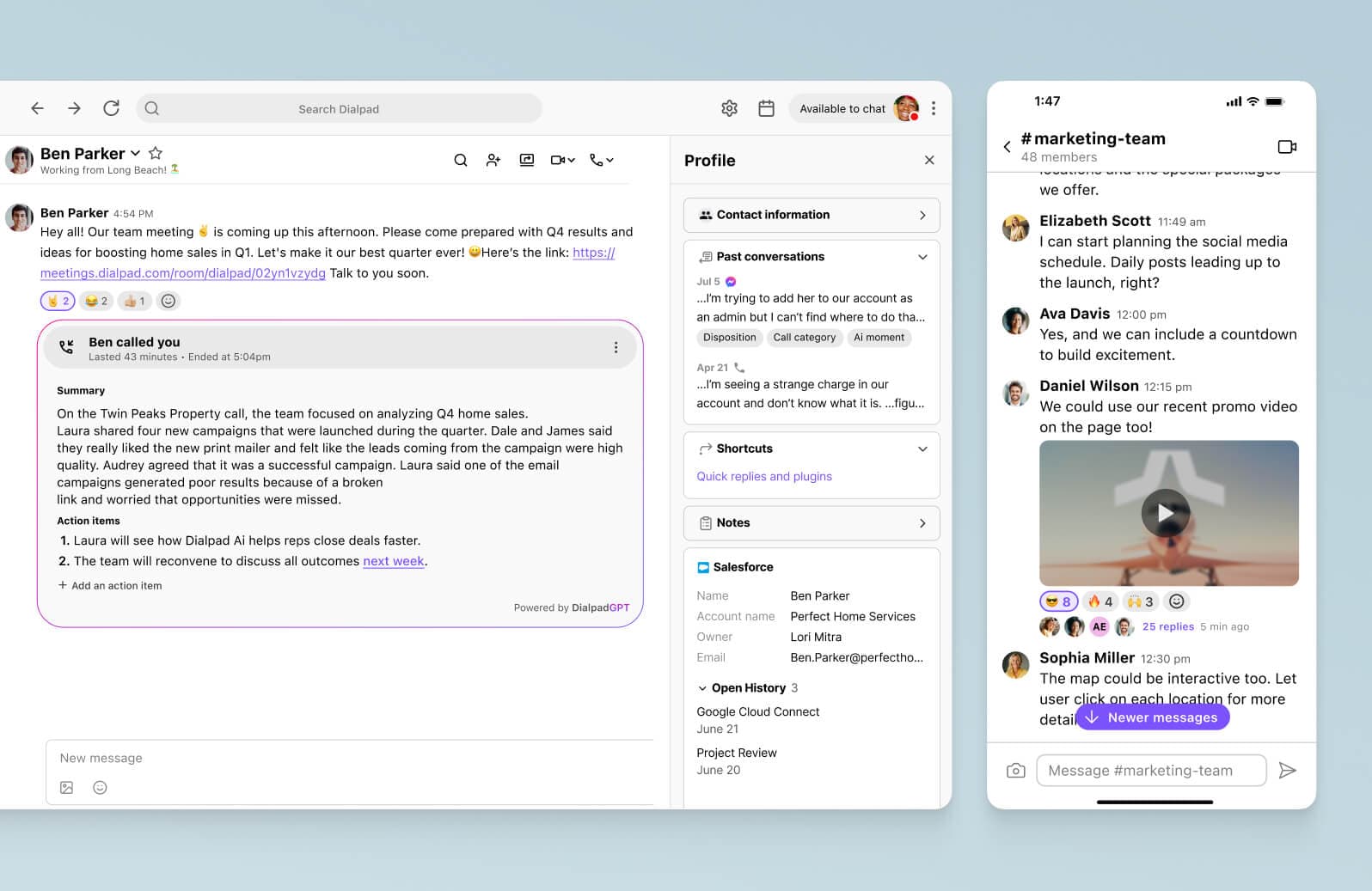How to scale a business: 6 tips to help your UK company go from strength to strength

Director of Content

Tags
Share
A scaling business achieves significant growth without a commensurate increase in overheads. The company does more business, more efficiently. It thus becomes more profitable.
Scaling is only appropriate for certain businesses—and only at certain times. For example, start-ups that have successfully navigated their first few years may well find themselves ready to scale.
Timing is crucial. Going for scale too soon can be damaging. Internal systems may get strained to breaking point or customer service fails. Leaving it too late, may allow competitors to beat you to it.
So, if you think your business might be ready, read on to learn all you need to know about how to scale a business.
Unified Communications to Help Scale Your Business
Talk, message, meet, and support customers—all in one beautiful workspace.
What is scaling in business?
What does scaling mean in business terms? A scaling business dramatically increases its revenue while avoiding incurring an equally dramatic increase in costs. That extra revenue may come from more customers, higher revenue per customer, or a combination of these two factors.
Scale vs. Growth: What’s the difference?
“Scaling” a company is not the same thing as “growing” a company. So, what’s the difference?
This first chart illustrates a company experiencing business growth:

This hypothetical business identifies an opportunity to increase its revenue. However, it only manages to exploit that by spending lots of cash. It may invest in the following:
Employing a larger sales or support team.
Opening more shops.
Renting more office or warehouse space.
Employing a larger back office team.
Doing this allows a business to extend its reach and, thus, increase its revenue. These higher overheads, though, eat into the potential profit (the difference between revenue and costs).
Now let’s consider a different scenario. The chart below shows a business that is scaling—it’s growing, but in a much more dramatic way:

This business is also experiencing revenue growth, but it’s not experiencing a simultaneous jump in overheads.
The revenue growth is far outstripping the shallower growth in costs. The new revenue achieved is not dependent on particular substantial additional costs. This business is becoming more profitable over time.
Both business growth and scaling may see a business substantially raise its revenue. And both can be positive for a business’s development. For example, in the very early days, a new business needs to grow—and find its feet—before it can think of scaling.
However, profitability gives a more accurate picture of an organisation’s vitality. As the charts illustrate, scaling is more likely to boost profitability than growth.
Business scaling strategy: 6 tips for developing one that will work for you
Think your business is ready? What can you do, then, to find a scaling strategy that will work for you? Here’s some tips for scaling a business:
1. Identify the right time to scale
Successful scaling requires both an external opportunity and internal readiness.
First, you need to identify a substantial growth opportunity: An untapped appetite for your product(s). That means a wider, fertile market for your product. And it’s also helped by fair economic conditions and an amicable regulatory environment. These factors help to create an opportunity.
However, potent external conditions do not guarantee scalability. You might be able to grow in this scenario. Your revenues might soar, but so might your costs. And if that happens, profitability will languish.
Scaling your business means exploiting the opportunity in a way that maximises your profitability—higher revenues without a commensurate increase in overheads.
Thus, choosing the right time is one of the keys to scaling a business successfully. You don’t just need an external opportunity. You also need confidence in your organisational readiness.
You need the right people, the right tools, the right processes, and the right culture to facilitate growing revenues, without ploughing in ever more cash.
👉 DIALPAD TIP:
If you’re starting to struggle with a large volume of calls, Dialpad’s smart routing and auto attendant features can make a big difference—just not to your costs.
2. Refine your business model
Your business model will determine how viable it is to scale (rather than simply grow) your business.
Is your product right for your market? Would certain tweaks open a further ripe, potential market for your product? Can you sharpen your product, marketing, or sales strategy to target your audience(s) better?
Strategize your selling to maximise revenues for minimal effort. For example, find the right balance between new customer acquisition and increasing the revenue you generate from customers you already have. And, of course, use segmentation, including all the automation tools available to support this.
3. Build the right team for scaling
When scaling a company, you need to ensure the following departments are ready to take on a potentially rapid growth in activity:
Customer support: You need a dedicated, empathetic, and organised team, ready to deal with the higher call volume that scaling is likely to entail. Dialpad’s features make it easy for your support team to do so, whenever and from wherever they need to.
IT support: Your scaling business will be dependent on a rock-solid IT infrastructure, so you will need the right team in place to maintain it—keeping your employees and customers up and running at the same time.
Marketing and sales: You need the best team to generate momentum for your product, making the most of the opportunity.
This isn’t about head count. It’s about gathering the right people who share your passion, drive, and vision. Scaling is hard work. You need people with the hunger and determination to make it happen.
You need fantastic team players more than free spirits. Focus on cross-team standardisation and consistency. An instinct to collaborate to build optimised, cross-department processes is crucial.
4. Focus on relationships
The challenges of scaling need to be tackled as a united team, positively and with a shared vision.
Firstly, internal relationships are supremely important. Effective communication will be key to solving the challenges that inevitably will arise. Throwing money at a problem will often seem easiest. But collaboration enables more creative solutions to emerge (such as sustainable workflow optimisations).
Secondly, a scaling business will also need to lean on external relationships more heavily (with suppliers, for instance). Finally, customer relationships are fundamental for any business. But for a scaling business, dealing with the increasing number of these in an efficient and appropriate manner is going to be both challenging and essential.
Communication is the key to success across all these relationships. That has a cultural dimension—emphasising dialogue, collaboration, and teamwork. But it is also a question of infrastructure. Are the right tools in place to support excellent communication?
Getting this right can make a huge difference. For example, investing in a unified communications platform like Dialpad can meet all your communication needs, from supporting team collaboration to customer contact.

5. Adopt scalable processes
With business growth, you do (for example) twice as much work to get twice as much out. The return is proportional to what you put in.
When scaling a business you are trying to break that profit-suppressing link. You want to make lots more, without necessarily putting much more in. Breaking the link means profits can rise.
Adopting scalable processes is essential here. A cross-business view should be taken, across the whole business, to identify workflows, processes, and tasks that could be streamlined (e.g., made quicker and easier).
Consider the following examples:
Scheduling appointments
Logging customer details
Approving staff leave requests
Order fulfilment
Customer call handling
Marketing campaigns (e.g., sending segmented emails)
Generating reports
Such tasks can be onerous, tedious, and labour-intensive—a drain on your potential to scale.
However, scalability can often be engineered into your operations to avoid this. Collaborate and plan, across your business, to determine what can be done in a more scalable and standardised manner.
Technology will be pivotal. Just make sure your solutions truly are scalable. For example, Dialpad’s enterprise communication software makes it easy to add new users, agents, or even entire offices. It’s ready to grow with you.
6. Leverage technology
In many cases, technology will provide the tools to allow your teams to work at a greater scale—getting more done, more efficiently.
For example, choosing the right communication tool will become integral to your scaling business, whether for video conferencing between colleagues or nurturing customer relationships.
The best communication platforms will empower your agents to offer superlative customer care even as more calls pour in. For example, you can scale with Dialpad with the help of features such as interactive voice response, call routing, transcriptions, AI-powered agent support, voicemail drops, and more.

Learn how to scale a business and take your company to the next level
Scaling a business is tough. You need internal strength: A strong team, with a positive culture, who are committed to robust and coherent business growth.
Even then, it is not enough just to aim for scaling the business. Instead, it needs to be a deep commitment. Scalability needs to be woven into your culture, processes, tools, and workflows. Learn how other scaling businesses are using Dialpad to expand their communications and teams globally!
Scaling up and need a good communications platform?
If you need something that can handle phone calls, video conferencing, instant + SMS messaging, and more... Try Dialpad free for 14 days! Signup takes just a few minutes, and you'll be set up with a virtual phone number too. Or, take a self-guided tour and click around the app first!
